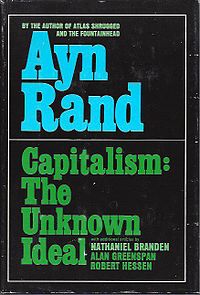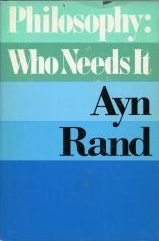 W
WAtlas Shrugged is a 1957 novel by Ayn Rand. Rand's fourth and final novel, it was also her longest, and the one she considered to be her magnum opus in the realm of fiction writing. Atlas Shrugged includes elements of science fiction, mystery, and romance, and it contains Rand's most extensive statement of Objectivism in any of her works of fiction. The theme of Atlas Shrugged, as Rand described it, is "the role of man's mind in existence". The book explores a number of philosophical themes from which Rand would subsequently develop Objectivism. In doing so, it expresses the advocacy of reason, individualism, and capitalism, and depicts what Rand saw to be the failures of governmental coercion.
 W
WCapitalism: The Unknown Ideal is a collection of essays, mostly by the philosopher Ayn Rand, with additional essays by her associates Nathaniel Branden, Alan Greenspan, and Robert Hessen. The authors focus on the moral nature of laissez-faire capitalism and private property. They have a very specific definition of capitalism, a system they regard as broader than simply property rights or free enterprise. It was originally published in 1966.
 W
WFor the New Intellectual: The Philosophy of Ayn Rand is a 1961 work by the philosopher Ayn Rand. It is her first long non-fiction book. Much of the material consists of excerpts from Rand's novels, supplemented by a long title essay that focuses on the history of philosophy.
 W
WIntroduction to Objectivist Epistemology is a book about epistemology by the philosopher Ayn Rand. Rand considered it her most important philosophical writing. First published in installments in Rand's journal, The Objectivist, July 1966 through February 1967, the work presents Rand's proposed solution to the historic problem of universals, describes how the theory can be extended to complex cases, and outlines how it applies to other issues in the theory of knowledge.
 W
WThe Moral Case for Fossil Fuels is a 2014 book by American energy theorist Alex Epstein, in which the author challenges the notion that the use of fossil fuels is detrimental to human life, and argues that their use dramatically improves the overall progress of humanity, including improving life expectancy and income. The book was a New York Times and Wall Street Journal bestseller.
 W
WThe New Left: The Anti-Industrial Revolution is a 1971 collection of essays by the philosopher Ayn Rand, in which the author argues that religion, the New Left, and similar forces are irrational and harmful. Most of the essays originally appeared in The Objectivist. A revised edition appeared in 1975, and an expanded edition edited by Peter Schwartz was published in 1999 under the title Return of the Primitive: The Anti-Industrial Revolution.
 W
WObjectivism: The Philosophy of Ayn Rand is a 1991 book by the philosopher Leonard Peikoff, in which the author discusses the ideas of his mentor, Ayn Rand. Peikoff describes it as "the first comprehensive statement" of Rand's philosophy, Objectivism. The book is based on a series of lecture courses that Peikoff first gave in 1976 and that Rand publicly endorsed. Peikoff states that only Rand was qualified to write the definitive statement of her philosophic system, and that the book should be seen as an interpretation "by her best student and chosen heir." The book is volume six of the "Ayn Rand Library" series edited by Peikoff.
 W
WThe Ominous Parallels: The End of Freedom in America is a 1982 book by the philosopher Leonard Peikoff, in which the author compares the culture of the United States with the culture of Germany leading up to the Nazis. The book has an introduction by the philosopher Ayn Rand, who describes it as "the first book by an Objectivist philosopher other than myself". Rand credited Peikoff with identifying "the cause of Nazism—and the ominous parallels between the intellectual history of Germany and of the United States".
 W
WPhilosophy: Who Needs It is a collection of essays by the philosopher Ayn Rand, published posthumously in 1982. It was the last book on which Rand worked during her lifetime.
 W
WThe Romantic Manifesto: A Philosophy of Literature is a collection of essays regarding the nature of art by the philosopher Ayn Rand. It was first published in 1969, with a second, revised edition published in 1975. Most of the essays are reprinted from Rand's magazine The Objectivist.
 W
WThe Virtue of Selfishness: A New Concept of Egoism is a 1964 collection of essays by the philosopher Ayn Rand and the writer Nathaniel Branden. Most of the essays originally appeared in The Objectivist Newsletter. The book covers ethical issues from the perspective of Rand's Objectivist philosophy. Some of its themes include the identification and validation of egoism as a rational code of ethics, the destructiveness of altruism, and the nature of a proper government.